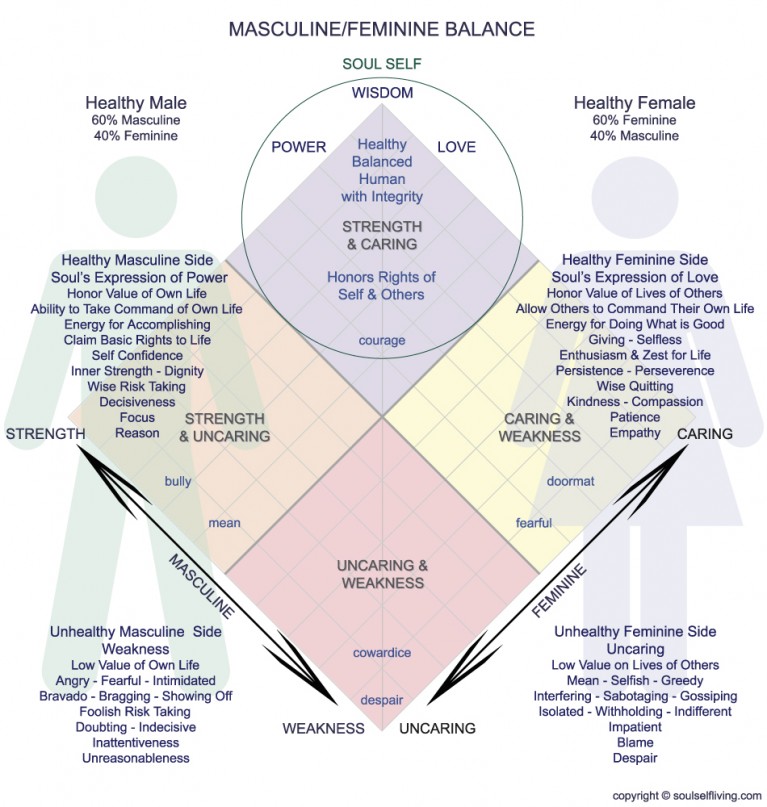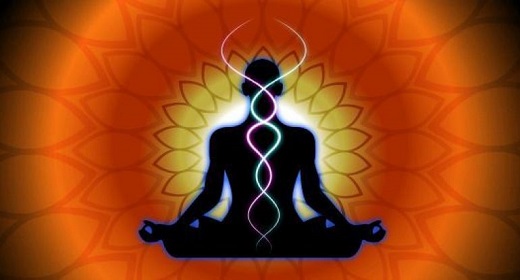by Jack Stephens: Examine where you find yourself on the chart…

As you consider the four quadrants of masculine-feminine expression, how much strength and caring do you exhibit? How balanced are you? Your family members? Your friends? Where can you allow more of your Soul to shine through? Most of us have various aspects of ourselves in different quadrants and it’s helpful to know where we are so we can figure out how to get to where we want to be. We hope that this is a useful tool to discover more about yourself, and we encourage you to focus on the behaviors that need improvement and the misperceptions that create them.
The Quadrants: Strength and Caring
Every so often you meet someone whom you would describe as a strong, caring person. They are focused and determined to do their best, and their competence stems from this dedication to self-mastery. They are compassionate with themselves and others, courageous in their trust of Spirit, and inspiring in their enthusiasm for life. They seem at ease with and in command of themselves. They access an inner wisdom and it shows in the way they treat themselves and others.
They are open to new ideas, enjoy new experiences, and take wise risks. They are mindful and aware, and decisive when they are clear about what course of action to take. They have a positive attitude, recognize the collaborative nature of life, and seek to create harmony with others. They take care to speak and act with integrity, even when this may mean breaking the rules.
Their humanity extends to all, with empathy for the well-being of others. They love their friends and family and care for them deeply. They laugh easily and enjoy the pleasures of life. They are thoughtful about the needs of others and are kind, patient, and protective of those who are weak. They know how to assist without interfering, and how to balance their generosity with self-protection. They are active in their community and, whether they are raising a child, running a business, coaching a team, tending a garden, cheering a friend, or volunteering at a food bank, they are devoted to the common good.
Mindful of their own health and well-being, they know when to pause and recharge, when to ask for help, and when it is wise to quit. They avoid toxins in their diet as well as in their environment, including people who would cause them harm. They keep themselves mentally, physically, emotionally, and spiritually nourished, healthy and strong. They have a zest for life and their enthusiasm is contagious. People and animals feel safe and cared for when in their presence.
The Quadrants: Caring & Weakness
When someone becomes a victim of their own generosity they are likely caring yet weak. They may value the well-being of others over their own and will give to others even at the expense of their own physical, mental, or emotional health. They may believe this type of suffering to be good. Sometimes this is rooted in low self-esteem or a sense of unworthiness.
They may partner with someone who takes advantage or even takes command of their life. In putting their own desires on hold, they teach people to treat them unfairly. They may feel overwhelmed by the demands of others. The repression and suppression of their own happiness can cause them to become depressed.
They may find employment where they lack passion or are not respected, or settle into relationships that are unfulfilling because they feel that they are undeserving of better. They are easily intimidated and often fearful. Their fear may make them anxious and defensive.
They may have difficulty standing up for themselves and doubt their strength. When they do find the courage to stand up to someone who is trying to overpower them, they mistakenly think that in doing so they are treating them unjustly when they are not.
Because of their fear they may remain a bystander when someone is causing harm, even when they could intervene or offer assistance. Often, they judge themselves because they don’t like their cowardice or low level of self-confidence and realize that they are not living up to their potential.
Sometimes those who deeply care about a cause, such as the health of the environment, may feel depressed and overwhelmed. The key is to find their strength through solutions-oriented activism; to focus on what is working, or innovate new ways to address the problems they want to be solved.
Generally, those who want to move out of this quadrant and into strength and caring need to build their self-love and explore and strengthen ways to care more for themselves. They would be wise to find the support they need to bolster their self-esteem and reclaim authority for their life.
The Quadrants: Strength & Uncaring
Perhaps you know someone who is sure of themselves and seems in command of their life. They are ambitious, driven, and get things done. Sometimes being liked is important to them, sometimes they would rather be feared. What is important is that they get things done their way.
For them, life is a battle, and winning is essential. They will strategize, evaluate, and take calculated risks. Sometimes they get the results they want, sometimes not, but they usually have a plan. Teamwork is important as far as achieving a goal is concerned. However, competition rather than cooperation is a driving force in the group dynamic. Rather than instilling confidence and a sense of safety, they intimidate. You are either with them or against them.
They can be mean, vindictive, and quick to anger. They may be pushy and take advantage of people. When they sense weakness in another person they see an opportunity to dominate. They can be physically, mentally, or emotionally abusive. While other people may be hurt by their unkind words or actions, they justify their greed, selfishness, manipulation, or brutality as necessary. They will fight to be right, and collateral damage is the price of winning the war.
Sometimes perceived as selfish or vain, their focus is on themselves. They may eat well, exercise, and take care of their physical appearance because it’s important to them to be strong, and to be perceived as powerful. Active engagement in community is not important to them unless it furthers their interests. The driving question that motivates their actions is, “what’s in it for me?”
The strong and uncaring person can have many guises. Sometimes they are puritanical or self-righteous in their religious beliefs or fanatical about their political views. They fight for their ideas at the expense of their relationships. They use shaming, guilt, coercion, condemnation, or shunning in order to force someone to agree with them. In this, they behave as a tyrant and victimizer. They lack empathy for the plight of others and their version of love is conditional. While they may protect what matters to them, it is often out of a sense of possessiveness or ownership, especially of their children or spouses.
Another form of the strong and uncaring person is the con man, seductress/seducer, interfering busy-body, or gossip. They may speak sentimental words to convince a person of their thoughtfulness and love. They might use flattery, gifts, or money to endeavor to gain trust. However, they prey on weaknesses of others to gain power over them. This is not real love.
To come into balance, those who are behaving primarily from this quadrant would be wise to care more for others and to deepen their sense of empathy and compassion. For example, they could volunteer for organizations that serve those less fortunate or practice meditation so that they can experience the interconnectedness of life. They need to find ways to recognize and appreciate the value of the lives of others, and use their strength to raise others up.
The Quadrants: Weakness & Uncaring
When someone’s masculine side is weak and their feminine expression is uncaring, they have lost integrity with themselves and others. They become fearful and easily intimidated. They belittle themselves and others, and hold a negative view of life. They think of themselves as victims of life and blame others for their circumstances.
In an effort to be perceived as strong, or perhaps to try to convince themselves of their strength, they may show bravado; boasting about their accomplishments or showing off to impress others. They seek recognition from others because they don’t recognize their own self-worth. They may even take foolish risks that endanger themselves and others.
They often feel isolated and alone because they keep themselves closed off from other people and don’t want to share of themselves or anything that they have. They are perceived as selfish or miserly because they may have lost trust in the caring of others and, in turn, have withdrawn their care as well.
The weak and uncaring person may lose focus on what truly matters. Their attention may become scattered or, conversely, obsessed with trivial things. They can be unreasonable and pessimistic. They may feel despair and even suicidal.
To come into balance, those who are primarily living in this quadrant are wise to focus on the positive aspects of life. When both strength and caring are in need of development, the approaches to improving balance depend greatly on the individual. For some, it would be best to strengthen their self-esteem. This could be through getting counseling or coaching, taking a self-defense class, or going to the gym. They could develop a level of mastery in a skill they enjoy using. Others may be drawn to focusing on the needs of other people through volunteer work, caring for animals, or participating in a community garden, musical group, or local club of fellow hobbyists.
Regardless of which path toward strength and caring a person might choose, it would also be helpful to get assistance from someone stronger and more caring. Professional counseling or coaching can accelerate the process of coming into balance.
Finding Balance
What does it mean to be a healthy, balanced human being?
Simply put, we have a masculine side that expresses as strength or power, which ranges on a scale from weak to strong. Our feminine side expresses as caring or love, which ranges on a scale from uncaring to caring. Because we embody both masculine and feminine qualities we always exhibit some combination of the two. A healthy combination expresses as wisdom.
The Soul Self is the alignment of the Soul, ego-mind and body with the Soul in charge. Our Soul is always powerful, loving and wise. Therefore, it is the ego-mind and body that must be balanced.
How do strength and caring combine to create a sense of wholeness, fulfillment, and purpose?
Healthy power is the strength of the Soul. Divine by nature, true power is never over another. Real strength can only be expressed when combined with love, so those who exhibit strength but not caring are truly only expressing a mid-level strength. And, those who express caring with little strength are limited in their expression of love.
Love can be a challenging word because of its many interpretations. Real love is the caring of the Soul and is expressed from the heart center. It is not syrupy sweet or conditional. That is sentimentality. Genuine caring involves no ulterior motives or convincing. It is unconditional. It is when you love no matter what.
True wisdom is the knowing of the Soul. The more we allow our Soul to guide our thoughts, words, and actions, the greater our expression of strength, caring and knowing.
What affects our balance?
The body and its hormones play a role, as does a person’s inner sense of Self. How has your upbringing shaped you? How has your life experiences effected your perception of yourself and others? Your Soul is inherently strong and caring. It is your ego-mind that shifts away from this natural state. The healthy development of each side depends on becoming aware of your misperceptions and then correcting them. How much of your Soul are you allowing to express?
How do men and women express healthy balance given their inherent differences?
According to The Ancient Ones, the healthy, balanced man allows the full expression of his Soul’s power, love and wisdom, which exhibits as 60% masculine and 40% feminine. A healthy, balanced woman who allows her full expression exhibits the inverse: 60% feminine and 40% masculine. This slight difference in polarity is necessary to create a positive charge in the relationship between healthy and balanced men and women. True partners and Soulmates who are balanced, both individually and together, can express the full potential of this combined masculine-feminine creative force.

















































